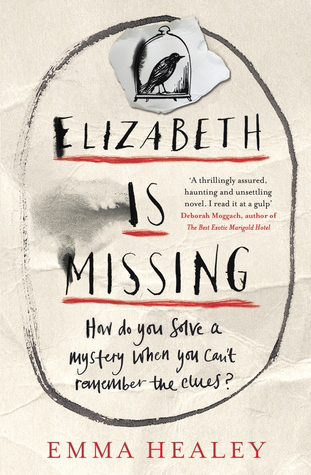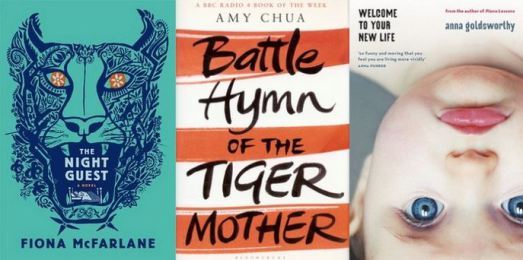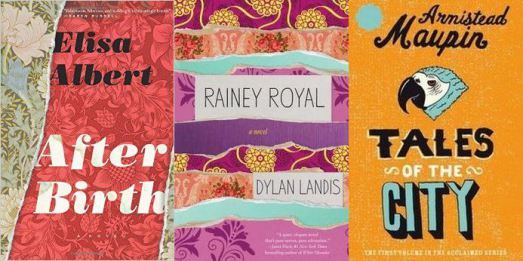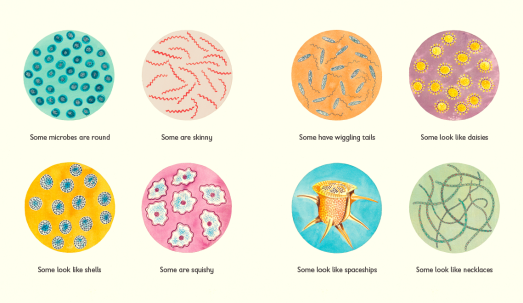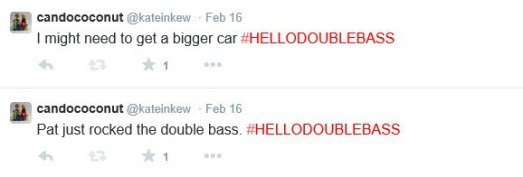Elisa Albert's Blog, page 3
May 2, 2015
Six Degrees of Separation - from Elizabeth is Missing to Tales of the City
It’s six degrees of separation for books. Created by Emma Chapman and Annabel Smith. Check out the rules if you want to play along.
We begin with Elizabeth is Missing by Emma Healy. It’s a mystery involving an elderly woman. A similar theme runs through The Night Guest by Fiona McFarlane.
It has a tiger on the cover which makes me think of Battle Hymn of the Tiger Mother by Amy Chua. Have you read it? Chua is a maniac, particularly about her daughters’ music.
Kids and music leads me to Welcome to Your New Life by Anna Goldsworthy – Goldsworthy was/is a concert pianist. And then she had a baby.
A baby can be challenging, as Elisa Albert explores in her controversial new release, After Birth.
Two very different stories but the covers of After Birth and Rainey Royal by Dylan Landis are one of the same in my mind. Shut up. I know they look completely different now that they’re next to each other but it’s that tapestry/ damask/ fabric thing.
Stories set in the seventies (such as Rainey Royal) link me to the ultimate – the Tales of the City series by Armistead Maupin.
Mysteries, tigers, stage mums, book covers and the seventies – all in six moves.
April 6, 2015
Review: After Birth by Elisa Albert
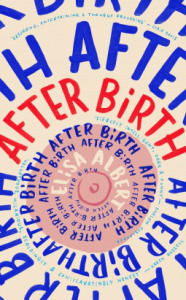 Looking for a heartwarming story about new motherhood? You won’t find it here. The narrator of Elisa Albert’s second novel, Ari, gave birth to Walker a year ago but still hasn’t gotten over the disruption to her life: the constant demands on her time and affection, the decay of her postgraduate thesis, and post-traumatic flashbacks to her caesarean section. Birth wasn’t the blissful, Earth Mother experience she wanted it to be; it was more like butchery: “nightmare blur of newborn stitches tears antibiotic awake constipation tears wound tears awake awake awake limping tears screaming tears screaming shit piss puke tears.” Now don’t get her wrong; she loves Walker: “He’s an awesome baby, a swell little guy. Still a baby, though, of which even the best are oppressive fascist bastard dictator narcissists.”
Looking for a heartwarming story about new motherhood? You won’t find it here. The narrator of Elisa Albert’s second novel, Ari, gave birth to Walker a year ago but still hasn’t gotten over the disruption to her life: the constant demands on her time and affection, the decay of her postgraduate thesis, and post-traumatic flashbacks to her caesarean section. Birth wasn’t the blissful, Earth Mother experience she wanted it to be; it was more like butchery: “nightmare blur of newborn stitches tears antibiotic awake constipation tears wound tears awake awake awake limping tears screaming tears screaming shit piss puke tears.” Now don’t get her wrong; she loves Walker: “He’s an awesome baby, a swell little guy. Still a baby, though, of which even the best are oppressive fascist bastard dictator narcissists.”
So even though Ari is reasonably happy and settled in her upstate New York home with her husband Paul (a professor 15 years her senior) and Walker, putting in the occasional shift at the local co-op and sending half-hearted ideas to her advisor, she can’t escape the thought that life isn’t as it should be. That is, until Mina Morris, bassist from a late-eighties girl band, moves to town to sublet her friends’ place while they’re on sabbatical in Rome. Ari had a girl crush on Mina before she ever met her, but when she realizes Mina is nine months’ pregnant, she sees a chance to put her new mommy expertise to good use. She’ll give Mina all the advice and support she wished she’d had. When the need arises, she’ll even breastfeed Mina’s newborn son, Zev. (Albert had a similar experience when her son was failing to thrive from breastfeeding and a friend fed him for her; see her Guardian article.)
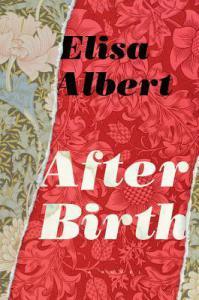 There isn’t a whole lot of plot to After Birth. Mina comes into Ari’s life for just two months and then moves on. Ari temporarily indulges her fantasy of a feminist collective where women help each other give birth and raise each other’s children; it is enough of a healing experience that she can conceive of resuming her thesis or even – ha! – having another baby. Still, she acknowledges that “the work of childbearing, done fully, done consciously, is all-consuming. So who’s gonna write about it if everyone doing it is lost forever within it? You want adventures, you want poetry and art, you want to salon it up over at Gertrude and Alice’s, you’d best leave the messy all-consuming baby stuff to someone else.”
There isn’t a whole lot of plot to After Birth. Mina comes into Ari’s life for just two months and then moves on. Ari temporarily indulges her fantasy of a feminist collective where women help each other give birth and raise each other’s children; it is enough of a healing experience that she can conceive of resuming her thesis or even – ha! – having another baby. Still, she acknowledges that “the work of childbearing, done fully, done consciously, is all-consuming. So who’s gonna write about it if everyone doing it is lost forever within it? You want adventures, you want poetry and art, you want to salon it up over at Gertrude and Alice’s, you’d best leave the messy all-consuming baby stuff to someone else.”
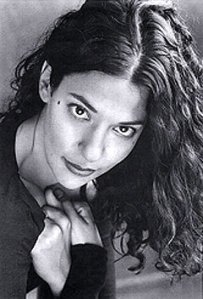
Elisa Albert (from her Goodreads page).
It can be hard to warm to Ari’s sarcastic voice and jarringly short or disorientingly run-on phrases. Albert’s choice to exclude speech marks means that the whole book reads like a sort of fever dream, with past and present and different voices melding. My favorite passage is a monologue by an Oprah-like black nurse who encourages Ari in her early attempts at breastfeeding. There are also frequent flashbacks to Ari’s childhood: Jewish summer camp and the aftermath of her mother Janice’s untimely death. The memories of her mother’s illness (DES treatment leading to breast cancer) and the touches of magic realism as the dead Janice occasionally pops up alongside Ari, usually kvetching about her choices, make this uncannily similar to The Year My Mother Came Back by Alice Eve Cohen.
After Birth might not prove to be a classic of ambivalent motherhood, but if you’re in the right mood for it I reckon you’ll find it to be a striking novella.
April 1, 2015
Women Writer's Check-in Vol. 2
At the end of last year, I made a personal resolution to make an effort to read more work by authors who are women. I will keep track of my progress over the course of the year on the blog. So far, here’s what I’ve read:
All About Love: New Visions by bell hooks
Gone Girl by Gillian Flynn
The Hip Hop Wars by Tricia Rose
Americanah by Chimimanda Ngozi Adichie
A Chosen Exile: A History of Racial Passing in American Life by Allyson Hobbs
Heroines by Katie Zambreno
Half of a Yellow Sun by Chimimanda Ngozi Adichie
Unbecoming by Rebecca Scherm
Pain, Parties, Work by Elizabeth Winder
Dark Places by Gillian Flynn
After Birth by Elisa Albert
Any recommendations?
March 15, 2015
In the Media: 15th March 2015
In the media is a weekly round-up of features written by, about or containing female writers that have appeared during the previous week and I think are insightful, interesting and/or thought provoking. Linking to them is not necessarily a sign that I agree with everything that’s said but it’s definitely an indication that they’ve made me think. Also, just a note to make it clear that I’m using the term ‘media’ to include social media, so links to blog posts as well as traditional media are likely.

It’s been a great week for women writers and prizes. The Wellcome Prize shortlist was announced on Monday, including four books (of six) by women. Congratulations Miriam Towes, Alice Roberts, Sarah Moss and Marion Coutts. On Tuesday, the twenty-strong Bailey’s Prize longlist was announced. Chair of this year’s judges, Shami Chakrabarti discussed the need for the prize in The Guardian and Buzzfeed created a guide to the longlisted books. The OCM Bocas Prize for Caribbean Literature has five women (of nine) on the longlist. Congratulations Tanya Shirley, Monique Roffey, Tiphanie Yanique, Elizabeth Nunez and Olive Senior. The PEN/Faulkner award has three women on a shortlist of five. Congratulations Emily St. John Mandel, Jennifer Clement and Jenny Offill. The Stella Prize, the Australian prize for female writers announced its shortlist this week too. Congratulations to Maxine Beneba Clarke, Emily Bitton, Ellen Van Neervan, Sophie Lagune, Jean London and Christine Keneally. Marina Warner won the Holberg Prize 2015. And women won four of the six categories at the National Book Critics Circle Award. Congratulations Marilynne Robinson, Roz Chast, Ellen Willis and Claudia Rankine.
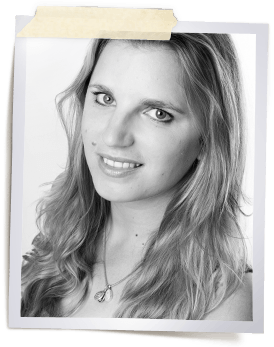
It’s Mother’s Day in the UK today. Jo Hogan writes ‘Surprised by a Jumper: On Being Motherless on Mother’s Day‘ on her blog; Scottish Book Trust list ten books that celebrate pioneering women; Emma Healey wrote, ‘From Offshore to Oranges: a literary tribute to Mother’s Day‘ in the Guardian; Emylia Hall wrote, ‘The Mother of All Years‘ on her blog; Windmill Books published an extract of Charlotte Gordon’s forthcoming book, Romantic Outlaws: The Extraordinary Lives of Mary Wollstonecraft and Her Daughter Mary Shelley on their website, and Kate Hamer wrote, ‘Literary matriarchs and their daughters, from Little Women to Carrie‘ in the Independent
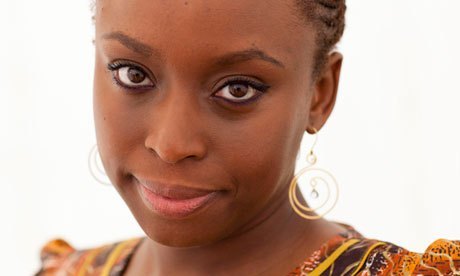
Two in-depth Chimamanda Ngozi Adichie interviews have been published this week, one in Vogue and the other on Olisa.tv: part one and part two.
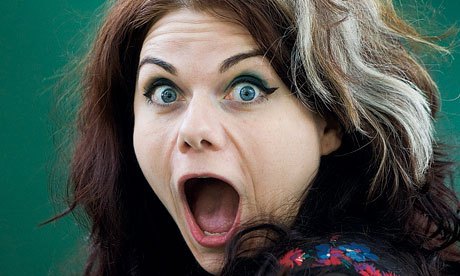
The woman with the most publicity this week is Caitlin Moran. She’s interviewed on Buzzfeed and on the British Comedy Guide with her sister Caroline Moran; Pilot Viruet wrote, ‘Caitlin Moran’s UK Series ‘Raised by Wolves’ Is the Teen Sitcom America Needs‘ on Flavorwire; she’s profiled by Vanessa Thorpe in the Observer and her own Times Magazine column this week was ‘What it really means to be a mum‘ which you can listen to for free here.
And the latest on the Harper Lee story: on Wednesday, The Bookseller reported, ‘State investigators interview Harper Lee‘ and on Friday, Lee’s agent issued a statement, The Bookseller reported, ‘Nurnberg blasts ‘shameful’ Lee claims‘.

The best of the rest articles/essays:
Rene Denfeld, ‘Writing the Truth About Criminals‘ on Read Her Like an Open Book
Hannah Furness, ‘Joanna Trollope: “You cannot be great novelist until after 35”‘ in the Telegraph
Lizzy Kremer, ‘On the Way to Where You are Going: A Writer’s Patience‘ on Publishing for Humans
Anuradha Roy, ‘No Longer a Joke‘ in The Telegraph, India
Kate Williams, ‘introduces you to The Storms of War‘ on One Book Lane
Elinor Abbott, ‘Rooms I Have Lived In‘ on The Bohemyth
Louise Walters, ‘One year on from publication and the things I’ve learned‘ on her blog
Kimberly Chrisman-Campbell, ‘Cinderella: The Ultimate (Postwar) Makeover Story‘ in The Atlantic
Alison Flood, ‘New Star Wars novel to feature first lesbian character‘ in The Guardian
Pandora Blake, ‘Don’t ask if porn “empowers” women – instead, ask if your feminism does‘ in the New Statesman
Felix Kent, ‘Our Hearts Were Young and Gay: On Weakness, Strength, and Friendship‘ in The Toast
Lindsey Gates-Markel, ‘He Doesn’t Wanna Be Here‘ on The Rumpus
Kelly Davio, ‘The Waiting Room: Sick Girl Walking‘ in The Butter
Sara Bivigou, ‘The Bad Blood: My Life With Sickle Cell Anaemia‘ on Buzzfeed
Mallory Ortberg, ‘Arthur Rimbaud, Dirtbag Laureate‘ in The Toast
Sarah Seltzer, ‘Female Friendship Is Life’s Great, Thwarted Romance in Elena Ferrante’s Neapolitan Novels‘ on Flavorwire
Claire Fuller, ‘Big Loves: on Barbara Comyns’s Who Was Changed and Who Was Dead‘ on Memorious Mag
Melissa Febos, ‘The Book of Hours‘ in StoryQuarterly
Katharine Quarmby, ‘The taboo of sex and disability: How can we shift the negative images that still dominate society’s attitudes?‘ in the Independent
Susie Day, ‘Short is sweet: why I love short stories‘ in The Guardian
Lois Leveen, ‘Appropriating (F)Acts in Feminist Fiction II: Juliet’s Nurse‘ on For Books’ Sake
Elisa Gabbert, ‘The Bravery of “Basic“‘ on Real Pants
Anna Cabe, ‘Milking the Bull: On Heroines‘ in The Toast
Rachel Basch, ‘At The Blue Dolphin: On Mothers and Sons‘ on The Millions
Kate Graham, ‘The Life and Legacy of Anne Frank‘ in Stylist
Mallory Ortberg, ‘Texts from Blanche DuBois‘ in The Toast
Kaye Toal, ‘How Finding A Fat YA Heroine Changed My Life‘ on Buzzfeed
Mallory Ortberg, ‘It’s 2050 And Feminism Has Finally Won‘ in The Toast
Rebecca Altman, ‘American petro-topia‘ in Aeon
Frida Berrigan, ‘Uncle Pentagon‘ in Guernica
Helen Lewis, ‘The Digital Ducking Stool‘ in the New Statesman
Jill Lepore, ‘Richer and Poorer‘ in The New Yorker
Lori Day, ‘Aging while female is not your worst nightmare‘ on Feminist Current
Patricia Scanlan, ‘Should you call time on a toxic friendship?‘ on Gransnet
Kate Gale, ‘Reading American cities: Los Angeles in books‘ in The Guardian
Julieanne Smolinski, ‘I Am Not My Internet Personality, and You Probably Aren’t Yours, Either.‘ in The Cut
Melanie Finn, ‘Writers on Location: Tanzania‘ on Isabel Costello’s Literary Sofa
Rose George, ‘A Very Naughty Little Girl‘ on Longreads
Marcie Bianco, ‘This Feminist Children’s Book Is the Best Way Ever to Teach the ABCs‘ on MiC
Liska Jacobs, ‘Our Best Work: On Man Ray’s Hollywood Album and Me‘ on The Millions
Melanie Finn, ‘A Stitch in Time‘ on the Weidenfeld and Nicholson blog
Olivia Marks, ‘When Did Not Wanting to “Lean In” Become So Taboo?‘ in Vice
Molly Lambert, ‘Porntopia‘ on Grantland
Francesca Wade, ‘Happily Ever After‘ in the Times Literary Supplement
Anne Boyer, ‘Data’s Work is Never Done‘ in Guernica
Sarah Butler, ‘“A wild blip in the country’s consciousness”: writing the 2011 riots‘ on the Picador Blog
Alison Herman, ‘Why Tina Fey’s Racial Humor Is So Controversial‘ on Flavorwire
Allecia Vermillion, ‘The Brief, Extraordinary Life of Cody Spafford‘ on Seattle Met
Jennifer Gonnerman, ‘The Wrong Way‘ on Mother Jones
Anna Maxted, ‘Older women are in the spotlight, but the battle for equality is not over‘ in the Telegraph
Polly Samson, ‘My parents only got married because no one else would have me as a bridesmaid‘ in The Telegraph
Ashley C. Ford, ‘I’m queer no matter who I’m with. I won’t define myself differently for your comfort‘ in The Guardian
Chris Kraus, ‘on the Ambiguous Virtues of Art School‘ on Artspace
Elisa Albert, ‘My friend breastfed my baby‘ in The Guardian
Sarah McCarry, ‘On Kindness‘ in The Rejectionist
Lynn Sloan, ‘A Page a Day‘ on Bloom
Alice Driver, ‘My Own Trap‘ on Vela
Holly Robinson, ‘Writing Commercial Fiction and Loving It‘ on Publishers Weekly
Chimene Suleyman, ‘We cannot be outraged by UKIP if we are to support their rhetoric everywhere else‘ on Media Diversified
Claire Fuller, ‘Things About Canada: Claire Fuller Remembers 1982 Montreal‘ on House of Anansi
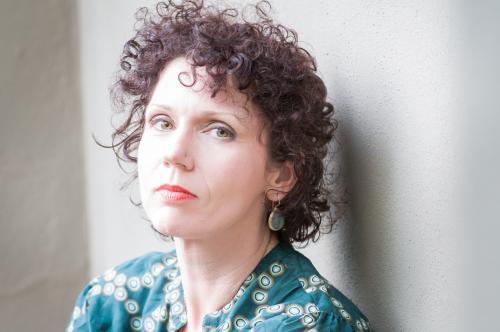
The interviews:
Jane Costello in the Liverpool Echo
Helen Macdonald on Salon
Roxane Gay, Germaine Greer, Rayya Elias and Elizabeth Gilbert at the All About Women Festival in The Guardian
Jaime Loren on Beauty and Lace
Kim Gordon on Faber Social and on Arts and Ideas
Iona Grey on Helen Redfern’s blog (plus cake!)
Susie Day in The Guardian
Kate Schatz on Buzzfeed
Toni Morrison in NEA Arts Magazine
Virginia Boecker on Publishers Weekly KidsCast
Laura Van Den Berg on The Millions
Melanie Finn on Orion Books
Jill Alexander Essbaum in the Wall Street Journal and on Electric Literature
Sarah Menkedick on Longreads
Emer O’Toole on Radio Gorgeous
Rosie Garland on Northern Soul
Holly Smale on We Love This Book (interviewed by her friend and former housemate Anna James)
Miranda July in the Irish Times
Anne Tyler on BBC World Book Club
Samantha Harvey in The Telegraph
Clare Fuller on Annethology
Marie Mutsuki Mockett on Electric Literature
Sarah Chayes in The Guardian
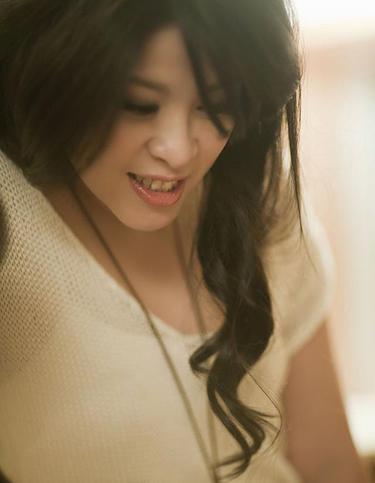
If you want some fiction/poetry to read:
‘All You Have to Do‘ by Sarah Braunstein in The New Yorker which she discusses here
‘For Eliza (My Great Grandmother)‘ by Katrina Naomi on Proletarian Poetry
An extract from The Day We Disappeared by Lucy Robinson
‘A Birthmother’s Catechism‘ by Carrie Etter on Seren Books’ blog
Five Short Stories by Lydia Davis in Five Dials
‘House Proud‘ by Amelia Gray in The White Review
‘Pomegranate‘ by Karissa Chen on Guernica
‘Children’s Stories Made Horrific: The Little Mermaid‘ by Mallory Ortberg in The Toast
‘Frost and Fire‘ by Claire Fuller on her blog
‘Aunt Mirrie and the Child‘ by Kate Clanchy on BBC Radio 4
‘Phantoms Over Paris‘ by Ali Smith in Five Dials
A new introduction to Living Dolls: The Return of Sexism by Natasha Walter on Virago
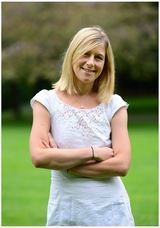
The lists:
Best Books to Read this March in Red
The Best Feminist Books For Younger Readers on Bookriot
Nine books you must read to understand women’s issues in India on Scroll.in
The Little Free Black Woman’s Library Book List – Volume 1 on The Free Black Woman’s Library
20 Wonderfully Miserable Memoirs: A Reading List for the School of Hard Knocks on Entertainment Weekly
9 Amazing Female Graphic Novelists, Illustrators And Cartoonists You Should Read on the Huffington Post
Inspiring Joan Didion Quotes in The Toast
50 Great Books About 50 Inspiring Women on Flavorwire
Sarah Bannan’s Coming of Age Novels on Bookanista (includes an extract from her novel Weightless)
Sarah Alderson’s Top 10 feminist icons in children’s and teen books in The Guardian
25 Essential Books About Death and Grief on Flavorwire
13 Things By Women You Can Read In One Sitting on Buzzfeed
Kelly Sundberg’s Eight Flash Nonfiction Writers on Vela
Five Fascinating Facts About Sylvia Plath on Interesting Literature
26 Contemporary Books That Should Be Taught In High School on Buzzfeed
74 Essential Books for Your Personal Library: A List Curated By Female Creatives on Open Culture
12 Sick Burns From People Who Didn’t Get The Jane Austen Hype on the Huffington Post
March 3, 2015
Book review: After Birth by Elisa Albert
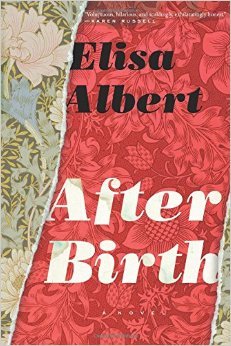 I love this book. Get it. Read it. Now.
I love this book. Get it. Read it. Now.
“After Birth” by Elisa Albert tells the story of three months in one woman’s life around a year after giving birth who befriends a former “almost” rock star/poet who is about to give birth. The narrator says of the poet: “I’m a little obsessed with her, by which I mean a lot, which I guess is what obsessed means.”
In that sentence, Albert achieves the creation of a distinctive character in her narrator: a sharp sense of humor, somewhat confessional, somewhat striving for clarity, while also somewhat muddled. Ari, the narrator, may not always be a sympathetic character (one of the first things she does is call the upstate city she lives – a fictional town called Utrecht, but an easily readable blend of Albany, Troy, Schenectady — a “shitbox”), but her language is so seductive that it can charm the reader, even in her most negative moments.
After all, Ari seems to be suffering from a kind of post-partum depression, a severe disorientation in which she feels betrayed by a world that didn’t prepare her for life after having a child, she’s lost interest in completing her doctorate in women’s studies, she feels isolated in the aforementioned “shitbox” town, and all of it has been exacerbated by having undergone a c-section operation.
If that weren’t enough, there is also that special kind of existential dread a parent faces by bringing a new life into the world: “I’m not going to pretend my kid is special, like other kids who starve and freeze and get raped and beaten and have to work in factories and get cancer from the fumes, too bad, so sad, but my kid is going to be warm and organic and toxin-free and safe and have everything he wants when he wants it and go to a good college and all is right with the world! Fuck that myopic bullshit. He’s going to suffer. He’s going to get mauled by some force I can’t pretend I can predict. We all live in the same fucked-up world.”
The turns in those few sentences — hard-edged realism to liberal-progressive hopes to a futile despair — can be read as openings into the kind of intellectual pathways a new mother faces. Much deeper (and darker) than the figure of a mother as a caregiver, caretaker, and nurturing figure, Ari delineates the strange subject-position having a child puts her in, a kind of territory of loneliness that her husband can never truly access, and one in which she can barely find any women who share her thoughts and ideas.
Albert writes of her ongoing failure to connect with others: “I’m telling you, I tried. I’d be friends with Hitler if he wanted to have a chill playdate. You have to find people, people with babies, and you might not technically like these people, but you’ll be so grateful for the shorthand, any blessed shorthand, that it won’t seem to matter. But it will matter, because you’ll be lonely, and come to feel terrifically fragmented, and death might come to seem like a relief. A baby opens you up, is the problem. … There’s before and there’s after. To live in your body before is one thing. To live in your body after is another.”
I read most of this book in one sitting. Albert has such a command of language and character that she pulls you along, wondering how Ari could possibly get herself into a better head-space when she is so good at describing the complex awfulness of her current situation.
February 19, 2015
Life 'After Birth': On Elisa Albert's Groundbreaking New Novel
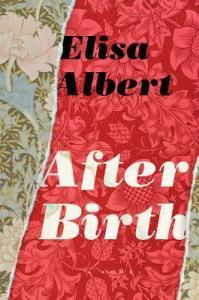 With her new novel, After Birth, Elisa Albert has already demonstrated a genius for concision. At under two-hundred pages, the book is fiercely brief, a breathless psychodramatic tour that begs to be re-read immediately. This is to say nothing of its perfectly clipped sentences — lines hijacked from a generation of men who seem not to know how to use them — that privilege clarity, precision, and rhythm above all else. And then the paragraphs: I’m convinced that Albert is among to the two or three best paragraph writers we have, mostly because, in their pithiness, they never sacrifice momentum.
With her new novel, After Birth, Elisa Albert has already demonstrated a genius for concision. At under two-hundred pages, the book is fiercely brief, a breathless psychodramatic tour that begs to be re-read immediately. This is to say nothing of its perfectly clipped sentences — lines hijacked from a generation of men who seem not to know how to use them — that privilege clarity, precision, and rhythm above all else. And then the paragraphs: I’m convinced that Albert is among to the two or three best paragraph writers we have, mostly because, in their pithiness, they never sacrifice momentum.
But the most startling act of concision might be the title of the novel itself: After Birth. A vacuum-sealed triple-metaphor, the title performs so much labor that it renders other titles lazy by comparison. To begin with: the book tells the story of Ari, a mother of one year, in the time following the birth of her son, Walker. On another level, it is an anti-bildungsroman that reveals what Ari has not learned in life — what no one told her about pregnancy, depression, childhood, marriage, whatever — in the years after her birth. Best of all, the novel’s unabashed viscerality, its raw newness in the world, conjures up the image its author’s wry mind (probably) intends. After Birth is the literary equivalent of afterbirth.
The novel is so fully itself, in other words, that it’s hard to believe it didn’t already exist. Plot-wise, it’s straightforward. It opens (and pretty much stays) in Utrecht, New York, a college town with ruin-porn Victorian houses, a “shitbox” where Ari lives with her gently annoying husband, Paul. From there the book unfolds as a series of reflections precipitated by a couple of events. After Ari’s friends go on sabbatical, they sublet their house to Mina Morris, a poet and former bass player of The Misogynists, a band pitched somewhere between Le Tigre and Sleater-Kinney. Ari quickly admits that she is “obsessed” with Mina, whose presence gives her an “obscure little thrill.” She sets out to become friends.
Mina, Ari learns upon seeing her, is very pregnant, which brings us to the second event. It is Ari’ son’s first birthday, or, as she calls it, surgery day. “I have trouble calling it birth,” she says. “Anniversary of the great failure.” The anniversary, Ari points out, is as much the non-celebration of her C-section as it is the celebration of Walker’s entry into the world. And it’s hard to imagine such a surgery rendered more perfectly in prose:
They cut me in half, pulled the baby from my numb, gaping cauterized center. Merciless hospital lights, curtain in front of my face. Effective disembodiment. Smell of burning flesh. Sewn back up again by a team of people I didn’t know, none of whom bothered to look me in the eye, not even once of them, not even once. Severed from hip to hip, iced, brutalized, catheterized, tethered to a bed, the tiny birdy’s heartfelt shrieks as they carted him off somewhere hell itself.
If it’s not already clear, Ari is “brutally” honest about her pregnancy, her son, her husband, her close friends (“I like Betsy, really I do, but she is jittery as fuck, and she says everything twice”), her town, and her family. Her own depression and estrangement is tightly swaddled in the memory of her mother, who was not exactly a nice person, and who died when she was fairly young.
The novel navigates Ari’s depression, although her emotional doldrums come across more as a sane response to an insane world. Albert refuses to infantilize readers who are already infantilized — especially on subjects like pregnancy, child-rearing, and female friendship — by bored journalists and TV hosts, who are paid to eschew novelistic depth. When it comes to her infant son, for example, Ari’s emotional reflections are manifold; they incorporate a range of human thoughts without which a person might seem sociopathic:
“The world so hideously perilous and the baby a raw egg, only of its kind.”
“I’m not going to pretend my kid is special, like other kids who starve and freeze and get reaped and beaten and have to work in factories and get cancer from the fumes…Fuck that myopic bullshit. He’s going to suffer. He’s going to get mauled by some force I can’t pretend I can predict. We all live in the same fucked-up world.”
“But the baby. The baby. I am not saying enough about the baby. Walker Him: a person! My son. His own person. Swell little guy. Sunny super-lovely love of a guy. If I kill myself, maybe he’ll grow up to be a poet.”
About a quarter of the way through After Birth, I became radically astonished by its newness. I felt diminished and enlarged. Obviously on the subjects of pregnancy, child care, and female friendship, I am a know-nothing. But it seemed wrong that the book did not already exist. It was almost as if I had been slighted by its previous non-existence. “No one,” I thought, “had told me this.” In a small way, I was mirroring Ari’s position in the world: “The baby books said nothing about this. Days became nights became days became nights. The baby books said nothing!” Albert’s novel is a hilarious, sad, elated, and, yes, brutal testament to the fact that the Socratic genius of contemporary American fiction is the domain of women writers who unlearn in order to bring something new into the world.
February 18, 2015
Bookish (and not so bookish) Thoughts
1. Did you have hot plans for Valentine’s Day? I did. Literally. My whole family went to the World Cup Cricket match between Australia and England, along with 90,000 others. We baked in the hot sun. Baked. Swear to God I sweated away five kilos.
2. How brilliant is this story about a book group?
3. I think I’ve mentioned that Nick Hornby and I are on thin ice. This might pull him back to safe ground – he’s writing the screenplay for Love, Nina by Nina Stibbe.
4. I don’t talk about children’s books on this blog much at all (because reviewing them is part of my actual job). But I do really love Tiny – The Invisible World of Microbes. It’s basically the best science picture-book I’ve seen. If you know a kid, get them this book.
5. Interesting list of ‘radical’ books about motherhood. – article is by Elisa Albert, whose new book, After Birth, is in my TBR stack.
6. Summer’s almost over. Wish I’d seen this earlier. #want
7. I never get tired of stripes. Never ever. #want
8. So now I have a double bass in my life. How do these things happen to me? It started with this:
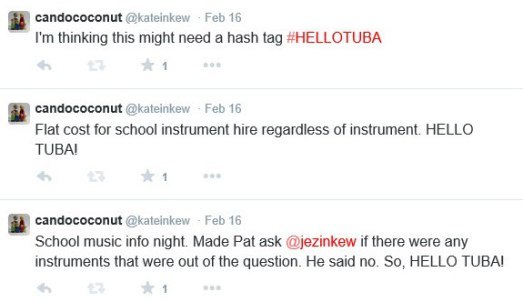 And then we got to the school and my son started trying #ALLTHEINSTRUMENTS
And then we got to the school and my son started trying #ALLTHEINSTRUMENTS
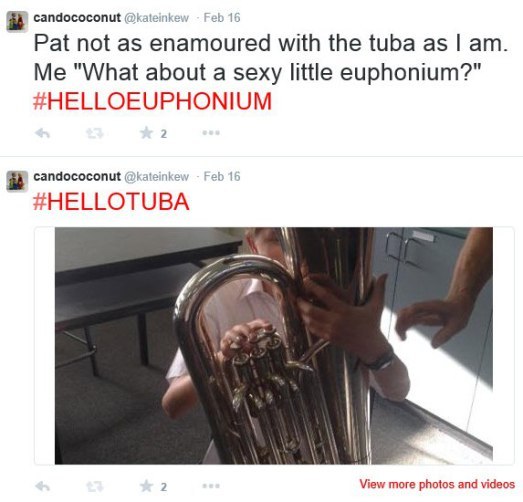 My son wasn’t feeling the tuba-love but was feeling the euphonium-love. Yay! But then he spied the double bass…
My son wasn’t feeling the tuba-love but was feeling the euphonium-love. Yay! But then he spied the double bass…
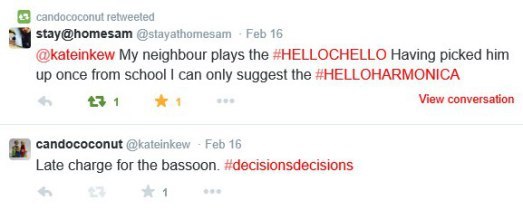 And then his final selections (the school then allocates instruments according to preference/ availability):
And then his final selections (the school then allocates instruments according to preference/ availability):
 Meanwhile, I pondered:
Meanwhile, I pondered: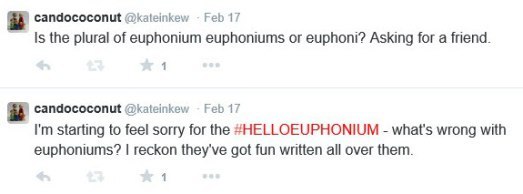 And then, yesterday:
And then, yesterday:
 Seriously, where the hell are we going to keep it? I’m not even joking…
Seriously, where the hell are we going to keep it? I’m not even joking…
9. The Katering Show. The We Quit Sugar episode made me snort. Seriously, if you don’t laugh about the Quinoa Stack, we can’t be friends.
Bookish Thoughts is hosted by Christine at Bookishly Boisterous. Pop over and say hi.
February 17, 2015
AFTER BIRTH: A New Narrative of Parenthood
August 2, 2012
I'm in love
It’s with Elisa Albert. She wrote this piece for Salon:
http://www.salon.com/2012/08/01/my_girl_problems/
I have now fucking died and gone to literary heaven. Or I am fucking Gertrude up in literary heaven, or something. Elisa, if you’re reading this, YOU ARE GOOD. Keep making scratches on paper. I haven’t read anything as lively for a long time.
May 19, 2011
Reviews of 'Sugar In My Bowl'
From Kirkus:
The approaches to the still-taboo topic of feminine sexuality—at least, for women writers seeking approbation from the literary establishment—are, as Jong notes, “as varied as sexuality itself” and as exuberantly diverse as the contributors themselves. They range from such emerging talents as Elisa Albert and J.A.K. Andres to such luminaries as Rebecca Walker, Eve Ensler, Susan Cheever, Anne Roiphe and Fay Weldon, and represent a multiethnic, multigenerational swath of some of the finest women writers in the United States. Most of the pieces deal with the perennial themes of sexual coming-of-age, social and religious sexual hang-ups and lusty obsessions for male bodies (as well as female ones). Some deal with lesser-discussed—but no less important—subjects like procreative sex and eroticism in old age. Still others fearlessly explore fetishism, childhood masturbation, kink, sexual addiction and the excitement that, in the words of Linda Gray Sexton, comes from “the offering up of one’s body like a sacrifice upon the temple of the bed.” While sex is the source of life and some of the most powerful joys—and agonies—imaginable, it is also invariably linked to death. And that, writes Jong, “is part of our discomfort with it.” But the contributors to this collection never make sex facile. As they work against cultural expectations and literary double standards, they make women’s depictions of “doing it” just another aspect of a more fully realized human consciousness.
A smart, scrumptiously sexy romp of a read.
From Salon:
As soon as I cracked opened Erica Jong’s new anthology, “Sugar in My Bowl: Real Women Write About Real Sex,” I was overcome with giddiness. The table of contents boasted female writers from august publications sharing the most intimate aspects of their lives. It isn’t common for serious female writers — the sort who write about respectable issues like politics and poverty — to dip their toes into that piranha-infested lake of personal judgment and criticism. Just as good girls don’t talk about sex, good-girl writers don’t write about sex. Not only can it be devastating personally, but it can also earn you a professional reputation as a chick lit author or, worse, a sex writer.
But here was Ariel Levy — author of the treatise against porn culture, “Female Chauvinist Pigs” — taking a break from her highbrow analyses of gender and sexual politics for the New Yorker to write about the first time she had sex. That’s not to mention: Gail Collins of the New York Times remembering the anti-sex education she received at her Catholic girls high school; Slate’s Meghan O’Rourke seeking solace in sex after her mother’s death; and novelist Anne Roiphe recalling playing doctor with a male friend at age 5, and then again as teenagers.
Read the rest from Salon here.
Read ReelGirl’s post on Sugar In My Bowl here.
The book comes out June 14. You can pre-order it here.
Elisa Albert's Blog
- Elisa Albert's profile
- 188 followers


